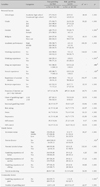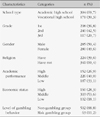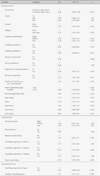Abstract
Purpose
The purpose of this study was to investigate personal, family, and community factors that affect gambling behavior of high school students.
Methods
The participants were 564 students from 7 high schools. Data were obtained from these participants between July 6 and July 20, 2011 by using self-report questionnaires. The data were analyzed using the PASW 18.0 program.
Results
Of the participants, 88.8% were in the non-gambling group, 11.2% in the risk for gambling group. Significant factors related to gambling behavior were 7 personal factors: alcohol consumption, suicidal ideation, experience of being a runway, irrational gambling beliefs, risk taking, stress, and self-control; 4 family factors: parental alcohol abuse, mother who gamble, sibling who gamble, and parental monitoring; and 2 community factors: peer who gamble and number of gambling peer.
Figures and Tables
Table 2
The Differences of Gambling Behavior of Subjects by Personal, Family, and Community Factors (N=565)

References
1. Barnes GM, Welte JW, Hoffman JH, Tidwell MC. Comparisons of gambling and alcohol use among college students and noncollege young people in the United States. J Am Coll Health. 2010; 58:443–452.

2. Blinne-Pike L, Worthy SL, Jonkman JN. Adolescent gambling: A review of an emerging field of research. J Adolesc Heath. 2010; 47:223–236.

3. Chon KK, Choi SC, Yang BC. Integrated adaptation of CES-D in Korea. Korean J Health Psychol. 2001; 6:59–76.
4. Eaton DK, Kann L, Kinchen S, Shanklin S, Ross J, Hawkins J, et al. Youth risk behavior surveillance: United States, 2007. MMWR. Surveillance Summaries: Morbidity and Mortality Weekly Report. Surveill Summ / CDC. 2008; 57(4):1–131.
5. Gottfredson M, Hirschi T. Commentary: Testing the general theory of crime. J Res Crime Delinq. 1990; 30:47–54.

6. Hwang SY. Parental attachment, parental monitoring, peer attachment, association with deviant peers, and problem behaviors: An examination of junior-high school students. Unpublished master's thesis. Seoul: Chung-Ang University;2007.
7. Hyder AA, Juul NH. Games, gambling, and children: Applying the precautionary principle for child health. J Child Adolesc Psychiatr Nurs. 2008; 21:202–204.

8. Hyun MY, Kim MD. A study of internet addiction and awareness of gambling among university students. J Korean Acad Psychiatr Ment Health Nurs. 2009; 18:95–103.
9. Jeon BJ. Self-esteem: A test of its measurability. Yonsei Nonchong. 1974; 11:109–129.
10. Kim HJ. Study of the factors influencing adolescent gambling behavior. Unpublished master's thesis. Daejeon: Chungnam National University;2009.
11. Kim HS, Choi YH, Yoo SJ. The study on the relations among ego-identity, stress, and internet addiction in high school students. J Korean Acad Psychiatr Ment Health Nurs. 2010; 19:173–185.

12. Kim JH, Lee DW. A study on strain and Juvenile delinquency. Seoul: Korean Institute of Criminology;1996. 05.
13. Kim KH. Self-regulation model of gambling behavior: The extension of common-sense model. Korean J Health Psychol. 2006; 11:243–274.
14. Kim MW. Psychological characteristics of adolescents problem gambling. Unpublished doctoral dissertation. Seoul: Sungshin Women's University;2004.
15. Kwon BS, Baek YM, Kim YH, Kim YY. Development of gambling prevention program for the public. Seoul: The National Gambling Control Commission;2009.
16. Kwon SJ, Kim KH, Choi JO. Awareness of adult gambling and predictors of gambling behavior in children. Korean J Health Psychol. 2006; 11:147–162.
17. Kwon SJ, Kim KH, Seong HG, Rhee MK, Kang SG. Illegal internet gambling: Problems, risk factor, and prevention strategies. Korean J Health Psychol. 2007; 12:1–19.
18. Lee H. Gambling risk factors and strategies of gambling industry. Seoul: The National Gambling Control Commission;2010.
19. Lee HP. Psychology of gambling. Seoul: Hakjisa;2002.
20. Lee HP. The effect of irrational gambling belief to the pathological gambling. Korean J Clin Psychol. 2003; 22:415–434.
21. Lee SM, Kim JN. Evaluation/diagnosis and related rates reflection the nature of gambling problems. Korean J Health Psychol. 2009; 14:1–26.
22. Molde H, Pallesen S, Bartone P, Hystad S, Johnsen BH. Prevalence and correlates of gambling among 16 to 19-year-old adolescents in Norway. Scand J Psychol. 2009; 50:55–64.

23. Nam HM, Ok SH. The effects of psychological family environment, self-control, and friends characteristics of middle school students on their problem behaviors. J Korean Home Econ Assoc. 2001; 39:37–58.
24. National Opinion Research Center at the University of Chicago. Chicago: Report to the national gambling impact study commission;1999. 02. Author.
25. Park YK. A study on actual analysis of juvenile delinquency in Korea. Unpublished master's thesis. Suwon: Kyunggi University;2002.
26. Rosenberg M. Society and adolescent self-image. Princeton NJ: Princeton University Press;1965.
27. Stattin H, Kerr M. Parental monitoring: A reinterpretation. Child Development. 2000; 71:1072–1085.

28. The National Gambling Control Commission. Industrial healthy development master plan of gambling. Seoul: 2008. 11. Author.
29. Yang JN, Choi EJ, Lee MH, So Y. Depression, impulsive behavior, and family health factors affects irrational belief of gambling and gambling behavior of young people. Korean J Youth Stud. 2011; 18:357–383.
30. Yeon MY. The influences of impulsivity, family's gambling activity and the distance from adolescence's home to the gambling facilities area on adolescents' gambling activity, gambling belief, and gambling motivation in the future. Korean J Psychol Soc Issues. 2006; 12:1–14.




 PDF
PDF ePub
ePub Citation
Citation Print
Print





 XML Download
XML Download